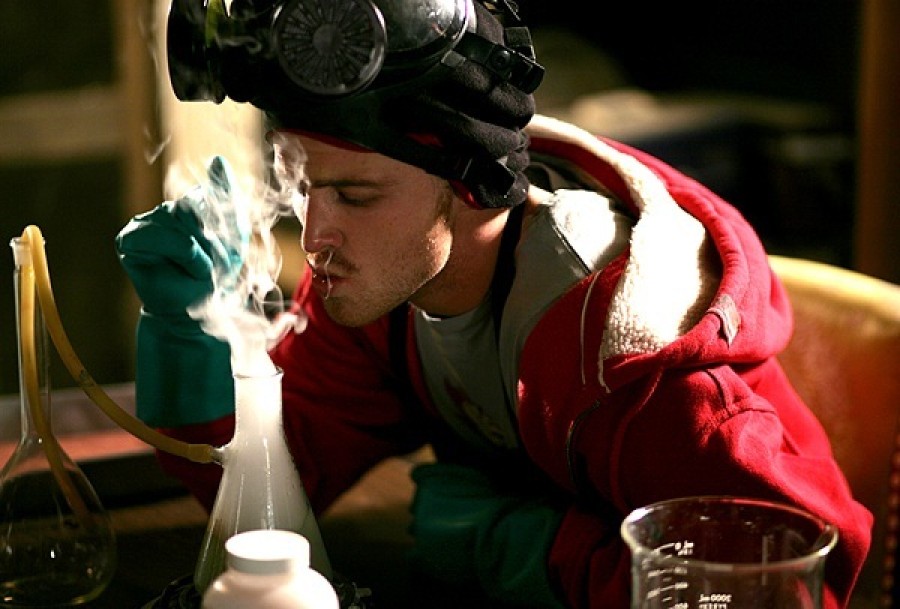Midwestern states battle big meth problem
By Carrie Shepherd

Midwestern states battle big meth problem
By Carrie Shepherd
The popular AMC drama Breaking Bad returned Sunday for its fifth and final season. The critically-acclaimed show follows the (mis)adventures of chemistry teacher turned crystal meth maker Walter White. White turned to his new profession after a cancer diagnoses delivered medical bills too high for his teacher salary. His mastery of the periodical table makes him a whiz in the lab, creating a hot product on the local New Mexico drug scene. In this scene, he teaches his new partner Jesse Pinkman (the distribution arm of the operation) how his science background can produce better meth.
The show is primarily a study of White’s personal decline (or rise) from family man to drug kingpin, but it’s also an interesting look into the underbelly of meth, a drug that has ravaged rural parts of the country. The Frontline documentary The Meth Epidemic followed The Oregonian’s investigative series exploring how federal laws, local law enforcement, the legal drug industry and meth’s addictive power have shaped the state. The documentary also takes a closer look at the drug’s effects on the body and brain.
As a neurobiologist, Dr. Celeste Napier knows all about these chemical effects. As part of her research at Rush University’s Research and Recovery Center for Compulsive Behaviors and Addiction, she studies how the brain reacts to the drug. She says that meth is becoming more sophisticated and potent, allowing users to become addicted more readily. Napier says there’s truth to the adage, “This isn’t your parents’ marijuana.” Drugs like meth and marijuana are far more advanced today than they were decades ago, offering users a greater high and better capacity for addiction. Dr. Napier says researchers like her are still searching for a medicinal recovery path for meth users, similar to how heroin addicts can take methodone. Meth and cocaine users currently don’t have access to something simliar, but rely on behavioral and congnitive therapy to find recovery.
This is where David Lee comes in. Lee founded Intervention Services, a company that connects an addict’s family and friends with an interventionist who helps connect the user with resources to guide recovery. Lee knows this path first hand. He’s an addict who has been in recovery for almost two decades. His first taste of meth came when he moved from Indiana to California, where the drug was spreading on the scene with bikers. He identifies himself at the time as binge user, coming off of days of intense use feeling conspiratorial and struggling with bi-polar manifestations. When Lee moved back to Indiana, he said he couldn’t find meth as easily as other drugs. Now, he sees the drug becoming more entrenched in the community-in both rural parts of the state and in the gay male community.
What David Lee sees in Indiana is not isolated. The state-like its Midwestern neighbors-has a formidable meth problem. Data from the Drug Enforcement Agency, or DEA, in 2011 reports 1,354 meth lab incidents in the state. Missouri (the state featured in the film Winter’s Bone) had 2,058 meth lab incidents in 2011. Illinois is faring a little better but both Napier and Lee say Southern parts of the state struggle with the drug, as well as the gay, male community that is prominant on Chicago’s North Side. But as Indiana Attorney General Greg Zoeller said at a recent press conference: “These problems don’t live within a geographical location, so we really have to focus on cross-border relations.” He joined forces with Illinois Attorney General Lisa Madigan to discuss more effective ways of combating the production and distribution of meth and other synthetic drugs.
Indiana Attorney General Zoeller joined Steve Edwards on Wednesday’s Afternoon Shift to discuss the challenges of keeping meth out of his state, and what role state and federal law enforcement plays. Dr. Celeste Napier and David Lee also joined the hour to talk about the effect meth has on the brain and body, and what steps are needed to find a path to recovery.
